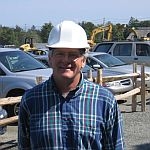(Host) Governor Jim Douglas is leading a delegation of Vermont business leaders to the Far East to boost employment opportunities in the state. The group leaves on its 10-day trip tomorrow.
By promoting a federal investor-visa program, Douglas hopes to encourage wealthy foreigners to make large investments in Vermont companies.
VPR’s Bob Kinzel takes a look at how the investor program is being used to finance a large expansion project at Jay Peak.
(Sound of construction)
(Bill Stenger) "What we’re doing here is, we’re continuing to do the final site work and we’re doing the concrete foundation work for the ice arena."
 (Kinzel) That’s Bill Stenger – the president and co-owner of Jay Peak – a popular ski resort just miles from the Canadian border.
(Kinzel) That’s Bill Stenger – the president and co-owner of Jay Peak – a popular ski resort just miles from the Canadian border.
Stenger is looking out at one of the largest construction projects northern Vermont has ever seen. When it’s done, Jay Peak will have two new hotels, including shops and restaurants, an ice arena, and one of the largest indoor water parks in the United States. The total cost is roughly $100 million.
Stenger says the project is essential to the future of Jay Peak.
(Stenger) "We can’t survive in this state any more as a ski industry if we are only one dimensional. The economics don’t work for just skiing. So our goal here is to be a 52-week-a-year resort with compelling things for people to do and reasons to come here every single week of the year."
(Kinzel) The project has no debt. None. That’s because it’s funded entirely by something known as the EB5 investor-visa program.
Here’s how it works. A foreign investor agrees to put at least $500,000 into an American business.
They become a limited partner of the business, but more importantly, the investor and their family members receive temporary green cards to live and work in the United States. The visas become permanent after two years if the project creates at least 10 new jobs.
Stenger says about half of Jay Peak’s investors are from England and most are interested in relocating to Florida or California. There’s no requirement that they ever come to Vermont.
Stenger views his project as an economic stimulus package for northern Vermont.
(Stenger) "We’ve got about 250 construction workers around this property right now. We’re going to employ upwards of 1,000 direct and indirect employees after we’re completed with all of the phases. And it’s going to energize the entire Northeast Kingdom."
(Kinzel) Stenger will accompany Governor Douglas on his trip and they’ve scheduled a stop in Seoul, South Korea.
They’ll visit with officials from Bio Tech Korea – a company that makes dialysis machines the size of a briefcase.
Stenger is hoping to finalize a contract for the firm to build a new plant somewhere in Orleans County using the EB5 financing program. The plant would initially employ around 200 people.
(Stenger) "Someone might say, `A bio0tech research company in Orleans County?’ Well, if that’s where the equity is, you bet that’s where it can be. … And it’s going to further develop the economy."
(Kinzel) Chris Barbieri has been working on Vermont-Chinese trade missions for 15 years and is also a member of the Vermont delegation. He says Vermont has a unique and very positive image with many Chinese officials.
(Barbieri) "We have a focus on the environment, which all Chinese are very interested in because of the problems that are occurring in China. And we’re a state where you can be a player, access to government access to a lot of things that you can’t get in the big city very easily. It’s a safe state. We have a focus on education and we have a sense of community. These are the things that Chinese people like."
(Kinzel) Barbieri says it’s critical to understand that the Chinese business culture is very different from the one here.
(Barbieri) "We tend to be an instant gratification culture. We tend to run sales opportunities. The Chinese do not like to do business that way. They want to develop a relationship, a personal relationship, with the people that they’ll be dealing with. So it requires a little more patience … and that’s where we sometimes run into stumbling blocks."
(Kinzel) The EB5 program does have some critics. Doug Hoffer is a Burlington policy analyst who studies labor issues. He says a 2005 report conducted by the Government Accounting Office raises some concerns about the program.
(Hoffer) "They found in 2005 that 26 percent of all the businesses established in this program were hotels, motels or restaurants. Now that’s not to say that they’re bad businesses. They’re good. We need them to some extent and arguably all jobs are needed. But these are not the type of jobs we should be targeting, it seems to me, with such programs."
(Kinzel) Hoffer says he’d like to see the program target smaller high-tech businesses in Vermont so that these companies can gain access to capital in a difficult economic period.
For VPR News, I’m Bob Kinzel in Montpelier.